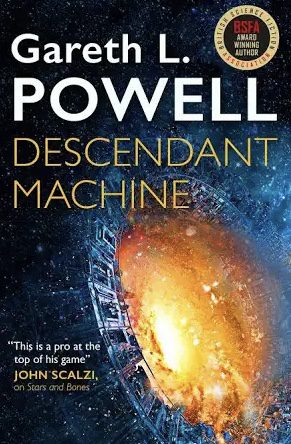
Synopsis
When Nicola Mafalda’s scout ship comes under attack, she’s left deeply traumatised by the drastic action it takes to keep her alive. Months later, when an old flame comes to her for help, she realises she has to find a way to forgive both the ship and her former lover. Reckless elements are attempting to reactivate a giant machine that has lain dormant for thousands of years. To stop them, Nicola and her crew will have to put aside their differences, sneak aboard a vast alien megaship, and try to stay alive long enough to prevent galactic devastation.
Review
Descendant Machine is uproarious fun. A true delight of a book that feels unabashedly indulgent. It’s playtime for the imagination, and I loved it.
Do you remember when you were a kid and the thought of travelling into space got you excited? Can you recall the giddiness of how cool it all was? How the conversations you had about spaceships and aliens didn’t turn into an ethics debate, but were just a really awesome way to spend an afternoon? That’s how I felt reading Descendant Machine — like a kid who was discovering the fun in space-opera all over again.
Gareth L. Powell has built up quite the catalogue of spacefaring sci-fi with his Embers Of War series, his novella co-written with Peter F. Hamilton (Light Chaser), and his BSFA Best Novel Nominated Stars And Bones. But in Descendant Machine, he’s let the brakes off, and the ride he takes us on is wilder, weirder, and more wondrous than ever. He’s described it as his “most Gareth L. Powell book yet,” and he’s not wrong.
To give you an idea of just how zanily brilliant this book is, let me tell you about the prologue. Well, the second prologue — the first one is an introduction letting you know that the book has been written by a spaceship. But the second, official prologue includes nuclear space-attacks, dilemmas over teleporting, and decapitation. And that’s all before you hit chapter one, where things REALLY get going!
See — I told you it was wild!
In terms of content, any sci-fi enthusiast is going to lap up the tale that’s woven across this universe. But in terms of style, the book comes into its own in the way it throws everything at the page. It’s written in such a character-centric way as the book toggles between multiple points of view. The risk a writer runs in taking this approach is that the characters can sometimes sound too alike. But not so here. This book is a masterclass in writing using a variety of voices.
The star of the show is Nicola Mafalda, a navigator with more snark than you can shake a stick at, whose brought back from retirement to save her furry four-armed alien boyfriend. She’s hilarious. An absolute joy to read, with layers of insecurity she masks in acerbic one-liners, a penchant for swearing, and bar-room brawls.
But Nicola’s snark doesn’t carry over to the other characters. Contrast Nicola with Orlando Walden — he’s a scientist who is tasked to unlock a massive machine that’s the size of a moon which some aliens believe will be the key to their rise to power. But Orlando is a stuttering wreck of nerves, and his chapters are told in the form of communications back to his beloved Ramona, for whose beauty the stars twinkle and the suns shine. His adoration is sickly with young love, but it provides an excellent juxtaposition to the other characters, who are all just as unique from one another as you can get. And that’s the joy of Descendant Machine — just how much it packs in to every page, even when it comes to something as nuanced as the diversity of the character’s voices.
Underneath the bravado, hijinks, and humour, the concepts and themes which drive the story are surprisingly provoking. There’s speculation over how a being without end can reconcile the terrifying finality of death, the chaos that sprouts from nationalistic propaganda, the folly of hubris, the impact of trauma, the symbiosis between ancestors and descendants, and how every individual (regardless of whether you’re a parent or not) shares responsibility for the next generation of humanity. Escaping death is a complicated business, and there’s no shortcut to a happy ending. But the way these heady concepts are snuck in without you even realising it highlights just how encompassing sci-fi can be — it can be serious and fun at the same time, and it totally works. While the tongue of this story may be very firmly in its cheek, there’s nothing flippant or unsubstantial about it.
In terms of scale, you’d be hard-pressed to find stakes that go much bigger than this. How does the end of the universe sound? Instead of measuring things in thousands of miles, the characters measure them in billions. And why not? Space is big. This story’s big. And everything in this story’s big! But just because the stakes are high, doesn’t mean they’re not personal. It’s heartfelt. It’s touching. And the whole thing just feels so… human.
Gareth L. Powell delivers, yet again. This is the second book in the Continuance universe (a standalone sequel to Stars And Bones which really does stand alone) but it also marks a continuance in itself. It continues this author’s reach into the impossible universe, to the places that lie beyond our imagination, and is sure to thrill longtime fans of his. But it also makes the perfect jumping in point. If you’ve never picked up a Gareth L. Powell book before, this will do the job nicely.
If you’re a fan of talking spaceships, impossible odds, and space-travelling antics, then Descendant Machine is the book you’ve been looking for. It’s fun dialled up to the max. It’ll put a smile on your face, a glow in your heart, and butterflies in your stomach. An absolute blast of a novel.
Release date: April 11th, 2023








Leave a Reply